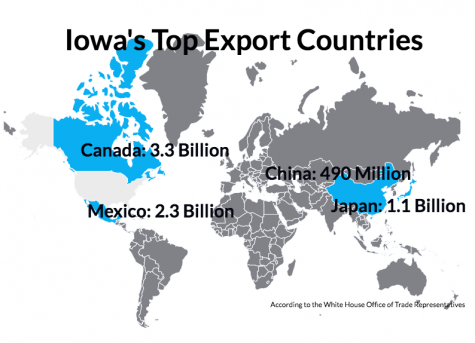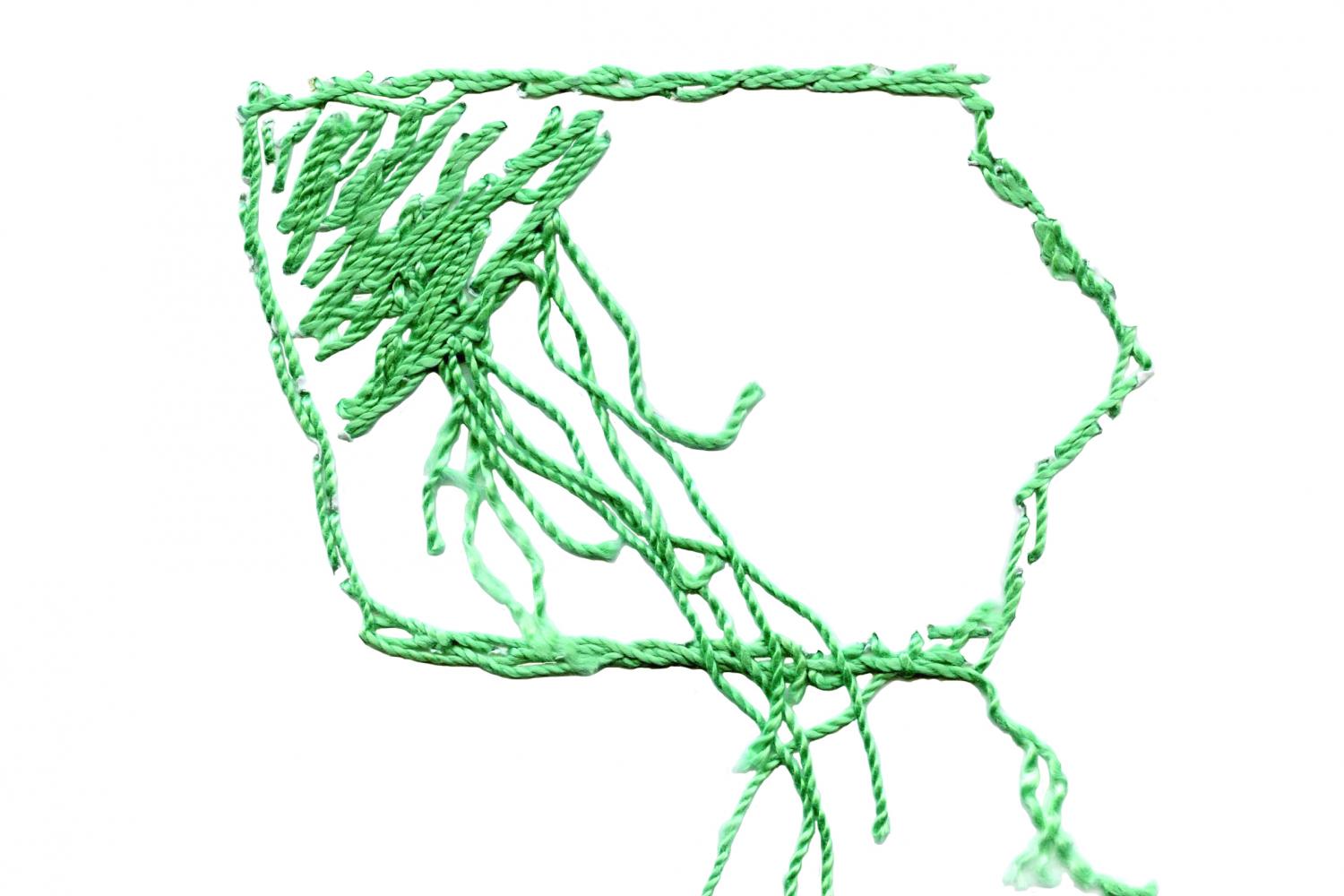Your donation will support the student journalists of Iowa City High School. For 2023, we are trying to update our video and photo studio, purchase new cameras and attend journalism conferences.
Caught in the Fray
The future of Iowa's agricultural industry under the new administration.
April 28, 2017
Iowa has always been known for its vast expanses of farmland and its agricultural business. The state conjures up images of rolling fields and pastures of livestock.
In fact, manufacturing and agriculture are two major players in Iowa’s economy, and a key part of that is trade. In 2016, 1.7 billion dollars of corn was exported out of Iowa, along with 3.6 billion in soybeans and 2 billion in pork, according to the US Census Bureau.
“With one in five jobs in Iowa dependent on trade, access to new markets is critical in our state’s economy,” a statement from Iowa Senator Joni Ernst said.
Free trade agreements are essentially a deal in which member countries agree to a decrease in barriers to trade in order to promote economic growth and expand free markets. Key aspects of trade agreements include lowered tariffs and no delays for importing goods.
“Trade agreements are a way to try and formalize trade between countries. The advantage to open trade is specialization. Countries can specialize in what they do best and by doing that, both countries benefit,” economics teacher Steve Dodge said.
Trade agreements are a key facilitator in Iowa’s exports, and in the US as a whole. How to go about making these decisions is very complicated, and often highly political.
“There are tariffs and quotas and other types of things the agreements try to reduce to try and prevent disagreements, like accusations that one country is limiting the trade of another. [With the agreements], there’s a problem solving process to hear those complaints and resolve them,” Dodge said.
resolve them,” Dodge said.
One of the most talked about trade agreements in recent years has been the Trans Pacific Partnership, or TPP, backed by President Obama. One of President Trump’s executive orders within the first week of his presidency was one withdrawing the US from the proposed 12 nation trade deal.
The action was a cause of concern for a number of people, including supporters of the new administration. Senator John McCain said he believed the action was a “serious mistake.” Senator Ernst, an outspoken Trump supporter, was another to voice disapproval.
“While I am disappointed in the executive action to withdraw the United States from the Trans Pacific Partnership, we can’t let this stop us from pursuing increased opportunities for our exporters,” Ernst said.
The trade deal would have lowered tariffs and other barriers to trade to some of the US’s biggest trading partners, including Mexico, Canada, and Japan, In 2015, Iowa exported 7.8 billion dollars in goods to nations in the proposed trade deal, according to a report from the Des Moines Register.
“In evaluating this particular agreement’s potential within the Agricultural Industry, there were definite possibilities to increase the movement of agricultural products into the countries that were involved in this trade pact,” Rhonda Clough, a professor of Agricultural Business at Kirkwood Community College, said via email. “The Asia-Pacific region is an area of great interest for increasing United States agricultural exports.”
Trade was a major platform on which President Trump ran, specifically on making the agreements more favorable to US workers.
In the same week Trump withdrew from the TPP, he also made the announcement that a border wall between the US and Mexico would be paid for with a border tax on imports into the United States, although it remains unclear if and when the tax will be instated.
Once again, the announcement was met with some uneasiness from Iowans in the agriculture and manufacturing business, including Craig Hill, president of the Iowa Farm Bureau Federation.
“Agriculture is a globally competitive industry. Any restructuring of current free trade agreements by imposing import taxes on other countries can result in them shopping elsewhere, just like any consumer would,” Clough said. “If a better alternative is available, the consumer will look there to do business.”
While a future with the US in the TPP is unlikely at this point, the nations included in the agreement remain expanding markets that the US, including Iowans, will look to for future trade opportunities.
Before President Trump met with Japanese Prime Minister Shinzo Abe in February, Senator Ernst wrote a letter to him encouraging him to pursue a bilateral trade deal that would provide opportunities to Iowa pork and beef producers.
“I have taken several steps to encourage this new administration to maintain and strengthen our existing trade agreements, while also looking for ways to pursue new trade opportunities,” Ernst said.
Iowa went to President Trump in the 2016 election, and a majority of rural counties in the state voted red. Trump continues to promise to renegotiate existing trade deals, including the North American Free Trade Agreement, or NAFTA, a major premise of his campaign. However, with Iowa’s economy so dependent on exports, trade deals are likely to remain a highly talked about issue throughout his administration.
“When considering any federal action or policy, what most agricultural producers want is a fair and level playing field around the globe with reasonable oversight and regulations,” Clough said.
